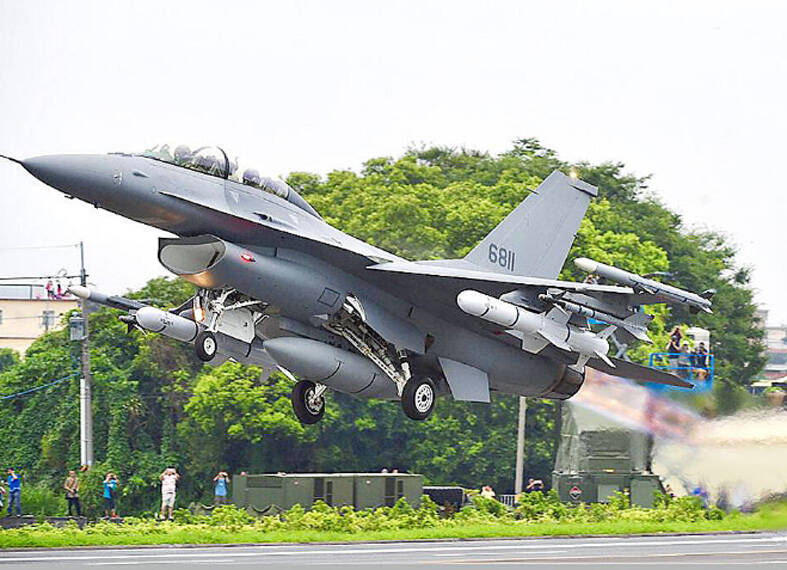The first of the nation’s 66 F-16 Block 70 jets is soon to roll off the Lockheed-Martin production line in the US, with Taiwan intending to send deputy minister-level officials to attend the event marking its completion, Minister of National Defense Wellington Koo (顧立雄) told a legislative committee on Thursday.
The US has also provided its preliminary list of who would attend the event, Koo said, adding that it would be inappropriate for him to divulge further information at the meeting of the Foreign Affairs and National Defense Committee.
The air force plans to send its deputy chief of staff to accompany the deputy minister of national defense to the event, air force Chief of Staff Lieutenant General Wang Te-yang (王德揚) said, adding that it would take place “soon.”

Photo: Peter Lo, Taipei Times
With the arrival of the F-16 Block 70, the air force would be operating two variants of the F-16 jets, with the F-16 Block 20 being upgraded after the Feng Chan Project (鳳展計畫), the Ministry of National Defense has said.
New equipment, including the AIM-120D air-to-air missiles outfitted by the air force’s Fourth Tactical Wing 22nd Tactical Fighter Group, has improved the air force’s ability to deter potential aerial invasions, it said.
After a year of training, F-16V jets in the air force’s Fourth and Fifth Tactical Fighter Wings have recently completed training exercises using AGM-88 high-speed anti-radiation missiles simulating attack runs against the Chinese People’s Liberation Army’s (PLA) radar facilities, it added.
The ministry is also considering purchasing electronic warfare pods to enhance its fleet of F-16V jets and would be listing the purchase in its fiscal 2026 budget, it said.
In other developments, the military’s five-day combat-readiness exercise is to commence on Monday involving all three services.
The exercise would be unscripted and simulate real combat scenarios, which would better prepare units for a possible invasion, the ministry said.
The military would be monitoring PLA “gray zone” exercises — which might mask potential real invasions — to assess threat levels and would conduct its own combat-readiness drills to prepare for any escalation, Koo said earlier this month.
The ministry said it is also extending the computer-assisted simulation and live exercise sections of this year’s Han Kuang drills to 14 days and 10 days respectively.
The military-affiliated Youth Daily News yesterday reported that the army’s Sixth Army Corps Commander Lieutenant General Chen Wen-hsing (陳文星) on Thursday convened a meeting with staff officers to prepare for the upcoming exercise.
The exercise aims to simulate real combat situations and test troops’ response to unexpected incidents, Chen said.
The goal is to ensure troops would be able to mobilize for warfare immediately, he said.

BUILDUP: US General Dan Caine said Chinese military maneuvers are not routine exercises, but instead are ‘rehearsals for a forced unification’ with Taiwan China poses an increasingly aggressive threat to the US and deterring Beijing is the Pentagon’s top regional priority amid its rapid military buildup and invasion drills near Taiwan, US Secretary of Defense Pete Hegseth said on Tuesday. “Our pacing threat is communist China,” Hegseth told the US House of Representatives Appropriations Subcommittee on Defense during an oversight hearing with US General Dan Caine, chairman of the Joint Chiefs of Staff. “Beijing is preparing for war in the Indo-Pacific as part of its broader strategy to dominate that region and then the world,” Hegseth said, adding that if it succeeds, it could derail

CHIP WAR: The new restrictions are expected to cut off China’s access to Taiwan’s technologies, materials and equipment essential to building AI semiconductors Taiwan has blacklisted Huawei Technologies Co (華為) and Semiconductor Manufacturing International Corp (SMIC, 中芯), dealing another major blow to the two companies spearheading China’s efforts to develop cutting-edge artificial intelligence (AI) chip technologies. The Ministry of Economic Affairs’ International Trade Administration has included Huawei, SMIC and several of their subsidiaries in an update of its so-called strategic high-tech commodities entity list, the latest version on its Web site showed on Saturday. It did not publicly announce the change. Other entities on the list include organizations such as the Taliban and al-Qaeda, as well as companies in China, Iran and elsewhere. Local companies need

CRITICISM: It is generally accepted that the Straits Forum is a CCP ‘united front’ platform, and anyone attending should maintain Taiwan’s dignity, the council said The Mainland Affairs Council (MAC) yesterday said it deeply regrets that former president Ma Ying-jeou (馬英九) echoed the Chinese Communist Party’s (CCP) “one China” principle and “united front” tactics by telling the Straits Forum that Taiwanese yearn for both sides of the Taiwan Strait to move toward “peace” and “integration.” The 17th annual Straits Forum yesterday opened in Xiamen, China, and while the Chinese Nationalist Party’s (KMT) local government heads were absent for the first time in 17 years, Ma attended the forum as “former KMT chairperson” and met with Chinese People’s Political Consultative Conference Chairman Wang Huning (王滬寧). Wang

CROSS-STRAIT: The MAC said it barred the Chinese officials from attending an event, because they failed to provide guarantees that Taiwan would be treated with respect The Mainland Affairs Council (MAC) on Friday night defended its decision to bar Chinese officials and tourism representatives from attending a tourism event in Taipei next month, citing the unsafe conditions for Taiwanese in China. The Taipei International Summer Travel Expo, organized by the Taiwan Tourism Exchange Association, is to run from July 18 to 21. China’s Taiwan Affairs Office spokeswoman Zhu Fenglian (朱鳳蓮) on Friday said that representatives from China’s travel industry were excluded from the expo. The Democratic Progressive Party government is obstructing cross-strait tourism exchange in a vain attempt to ignore the mainstream support for peaceful development